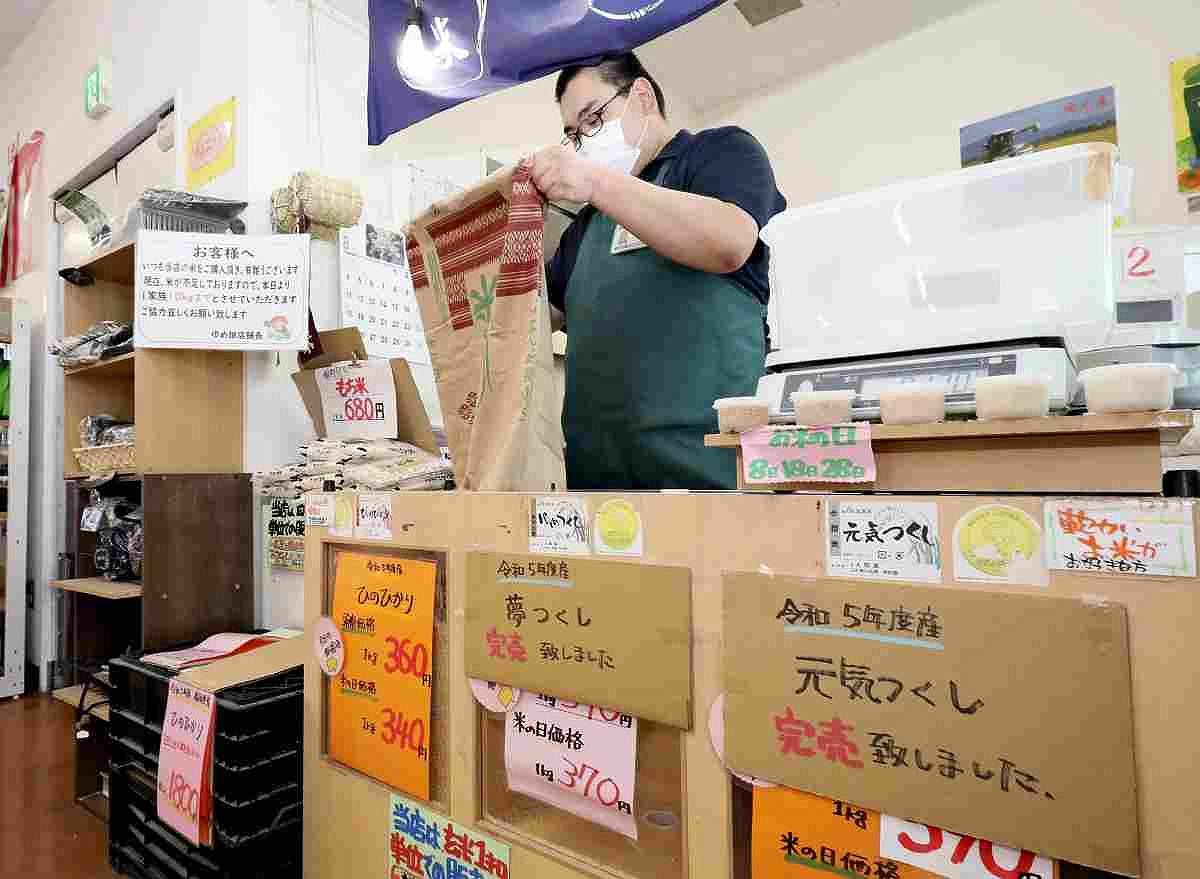Insufficient Rice Supply Hits Japan; Sever Heat, Rising Demand from Inbound Tourist Among Factors

Some rice brands had sold out at JA Chikushi’s direct sales outlet in Kasuga, Fukuoka Prefecture on Thursday.
20:10 JST, August 23, 2024
Japan has recently been hit by insufficient supply of rice. Declining supplies due to severe heat last summer combined with the return of inbound tourists has led to emptied supermarket shelves and purchase restrictions. Although shipments of rice harvested in 2024 will likely ease the shortage from late September, rice prices have soared.
An employee at JA Chikushi’s direct sales outlet in Kasuga, Fukuoka Prefecture, explained to a male customer Thursday that the rice brand he came to buy had sold out. The man was surprised to see an empty space where the brown rice was supposed to be and said, “I have never experienced rice selling out before.”
Severe heat last summer led to a deterioration in the quality of rice which in turn caused a shortage in the supply. At the same time, a sharp increase in demand followed businesses facing an influx of inbound tourism, which is moving at the fastest pace ever.
According to the Agriculture, Forestry and Fisheries Ministry, the stock of rice in the private sector at the end of June was at the lowest level at 1.56 million tons, down about 20% from the same month last year.
Moreover, an earthquake with an epicenter in the Hyuganada Sea off the coast of Miyazaki Prefecture on Aug. 8 has worsened the situation, as some people rushed to buy rice in preparation for a potential Nankai Trough megaquake. However, the ministry called on the public to remain calm, assuring that the full shipment of rice from the 2024 harvest will end the shortage.
The issue has impacted rice prices. The relative trading price for 60 kilograms of rice on average across all brands between the Japan Agricultural Cooperatives and businesses such as wholesalers reached ¥15,865 in June. It is the highest level in about 11 years — since August 2013 — when the 2011 Great East Japan Earthquake contributed to a rice shortage. July saw a slight decline in prices, but they were still 13% higher than the same month last year.
Top Articles in Business
-

Prudential Life Insurance Plans to Fully Compensate for Damages Caused by Fraudulent Actions Without Waiting for Third-Party Committee Review
-

Japan, U.S. Name 3 Inaugural Investment Projects; Reached Agreement After Considerable Difficulty
-

Japan’s Major Real Estate Firms Expanding Overseas Businesses to Secure Future Growth, Focusing on Europe, U.S., Asia
-

SoftBank Launches AI Service for Call Centers That Converts Harsh Customer Voices into Softer Voices
-

Transport Companies See Opportunity in Narita Expansion; Airlines, Railways Prepare to Meet Expected Growth in Demand
JN ACCESS RANKING
-

Producer Behind Pop Group XG Arrested for Cocaine Possession
-

Japan PM Takaichi’s Cabinet Resigns en Masse
-

Man Infected with Measles Reportedly Dined at Restaurant in Tokyo Station
-

Israeli Ambassador to Japan Speaks about Japan’s Role in the Reconstruction of Gaza
-

Videos Plagiarized, Reposted with False Subtitles Claiming ‘Ryukyu Belongs to China’; Anti-China False Information Also Posted in Japan
























